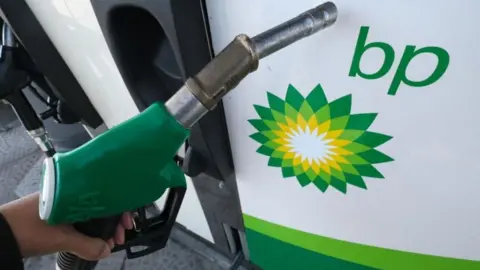Ukraine conflict: BP under pressure to sell stake in Russian firm
 Getty Images
Getty ImagesOil giant BP is under pressure from the UK government to offload its 20% stake in the Russian state-owned oil firm Rosneft, the BBC has been told.
Business Secretary Kwasi Kwarteng spoke to BP boss Bernard Looney on Friday following Russia's invasion of Ukraine.
He "left Mr Looney in no doubt about the seriousness of government concerns about BP's overexposure to Russian interests", an official said.
BP has said it is "closely watching the concerning developments" in Ukraine.
Mr Looney and former BP chief executive Bob Dudley have a seat on Rosneft's board alongside its chairman Igor Sechin, who is a close friend and ally of Russian President Vladimir Putin.
UK government officials hinted a disposal of BP's stake in Rosneft looked like the only plausible option to remedy a "deeply unsatisfactory" arrangement.
BP has owned the stake in Rosneft for more than a decade.
The PA News agency reported Mr Looney was in Russia as recently as October, when he appeared on a panel with Mr Putin, which he later described as a "privilege".
BP's final year results, published two weeks ago, revealed Rosneft accounted for $2.7bn (£2bn) of its profits, about a fifth of its total.
Mr Looney said at the time Russia was "a large member of the energy system. We avoid the politics, that serves us well in many countries around the world".
BP admitted last year sanctions on Russia could be problematic for its business and this week western allies have imposed a series of economic sanctions on Russia.


BP's 20% stake in a company majority-owned by the Russian state was always uncomfortable and Russia's invasion of Ukraine has led the government to think it untenable.
The boss of BP sits on a board with close Putin friend and ally, Rosneft Chairman Igor Sechin and other sanctioned board members.
Sources close to the Business Secretary Kwasi Kwarteng suggested selling the stake seems the only palatable solution.
It's proved a valuable stake for BP as oil prices have risen and it contributed nearly $3bn to BP profits last year.
It is a stark example of a grim paradox. The higher oil and gas prices rise, the more the countries that are dependent on Russian energy provide the fuel for the very war machine they are trying to stop.

In response to questions about Russia's invasion of Ukraine, BP said: "We are doing all we can to monitor the fast-changing situation.
"We are accounting for all our team and will continue to support them and provide any help they need.
"BP will, of course, comply with all relevant sanctions."
Following the invasion on Thursday, oil prices surged past $100 (£74) a barrel to hit their highest level for more than seven years.
Russia is the second biggest exporter of crude oil, and is also the world's largest natural gas exporter.
Europe gets nearly a third of its oil and about 40% of its gas from Russia, much of it flowing through pipelines across Ukrainian territory.
Concerns remain that sanctions could constrict supplies and drive up prices worldwide.

- JUST HOW 'PUNK' IS BREWDOG? Looking for the truth behind claims of a toxic working culture
- BUILT ON FAKERY: How did people from all over the word get entangled in the nets of 'Job Fishing'?'

